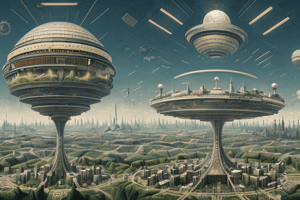Podcast
Questions and Answers
Who wrote the book Utopia?
Who wrote the book Utopia?
St. Thomas More
In St. Thomas More's book, what is Nusquama?
In St. Thomas More's book, what is Nusquama?
An imaginary realm
When was Utopia published?
When was Utopia published?
1516
What Greek words are used to describe 'no place' and 'perfect place'?
What Greek words are used to describe 'no place' and 'perfect place'?
What question did Nusquam answer?
What question did Nusquam answer?
What does 'Deus Ex Machina' mean?
What does 'Deus Ex Machina' mean?
In literature, what is 'Deus Ex Machina'?
In literature, what is 'Deus Ex Machina'?
Define paradox.
Define paradox.
What is Utopia as a vision?
What is Utopia as a vision?
What is Utopia as a concept?
What is Utopia as a concept?
What is Utopia as a literary genre?
What is Utopia as a literary genre?
What is Utopia as a historical work?
What is Utopia as a historical work?
Who wrote The One Who Walks Away from Omelas?
Who wrote The One Who Walks Away from Omelas?
When was The One Who Walks Away from Omelas published?
When was The One Who Walks Away from Omelas published?
The One Who Walks Away from Omelas is considered a classic utopia.?
The One Who Walks Away from Omelas is considered a classic utopia.?
What is speculative fiction?
What is speculative fiction?
What ultimate question does speculative fiction push the boundaries of literature toward?
What ultimate question does speculative fiction push the boundaries of literature toward?
What question does utopian literature explore?
What question does utopian literature explore?
What does the Utopian genre explore?
What does the Utopian genre explore?
Flashcards
Nusquama
Nusquama
Imaginary realm; first title of St. Thomas More's book.
Utopia
Utopia
An ideal society that doesn't exist, coined by St. Thomas More.
Ou-topos
Ou-topos
Greek for 'no place', highlighting the non-existent nature of an ideal society.
Eu-topos
Eu-topos
Signup and view all the flashcards
Deus Ex Machina
Deus Ex Machina
Signup and view all the flashcards
Paradox
Paradox
Signup and view all the flashcards
Speculative fiction
Speculative fiction
Signup and view all the flashcards
Utopian literature
Utopian literature
Signup and view all the flashcards
Dystopian literature
Dystopian literature
Signup and view all the flashcards
Study Notes
- St. Thomas More's book was first titled Nusquama, meaning imaginary realm.
- The book later became Utopia in 1516.
- The word Utopia comes from the Greek words "ou-topos" (no place) and "eu-topos" (perfect place)
- Utopia highlights the paradox of an ideal society that doesn't exist.
Utopia vs Eutopia
- Utopia means "no place."
- Eutopia means "good, perfect place."
Nusquam
- Nusquam answers the question "What if?"
Deus Ex Machina
- Deus Ex Machina translates to "god from the machine" in Latin.
- Deus Ex Machina is a plot device where a seemingly unsolvable conflict is resolved by a sudden, improbable intervention.
- This intervention involves a character or event appearing out of nowhere.
- A Deus Ex Machina event can rescue a character from certain death by a magical object or power that appears unexpectedly.
- Deus Ex Machina can be when a complex problem resolves with a simple solution.
Paradox
- A paradox contradicts itself or defies logic, often revealing a deeper truth.
- Paradoxes challenge our ways of thinking and exposes hidden complexities in concepts.
- Paradox can be a vision of an ideal or better society
- It can also be a philosophical and theoretical framework
- Paradox is presented as utopian literature that explores imagined perfect societies.
- Paradox is seen in Utopia, a book by St. Thomas More in 1516.
Evolution of Utopian Framework
- Pre-Modern (2000 BC-1400): represented by Plato's "The Republic."
- Early Modern (1516-1790s): focused on space and exploration.
- Modern (1700-1970s): dealt with socialism or barbarism, emphasizing temporality.
- Globalization (1970s - present): characterized by a Neoliberal Economy.
- "The One Who Walks Away from Omelas" (1973) by Ursula Le Guin is not a classic utopia, but self-reflexive.
- It serves as a blueprint for crafting a utopian narrative that doesn't necessarily aim for a better society.
Speculative Fiction
- Speculative fiction include science fiction, fantasy, utopia, and horror.
- Speculative fiction pushes the boundaries of literature's ultimate question: "Who am I as an individual?".
- Key elements involve topic, style, theme, and experience.
Utopian and Dystopian Literature
- Utopian literature explores the question "who are we as a society?"
- Dystopian literature explores the question "who are we afraid we might become?"
- Utopian genre explores ideal societies with common structures, themes, constitutive features (setting, structured society, narrative perspective), and conventions (recurring but flexible themes)
Exploring Ideal Societies
- Utopian genre has ironic self-awareness, acknowledging inherent contradictions in any perfect world.
- Marketing of utopian concepts involve appealing to readers through rhetoric and persuasive techniques.
Studying That Suits You
Use AI to generate personalized quizzes and flashcards to suit your learning preferences.




